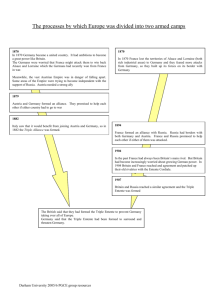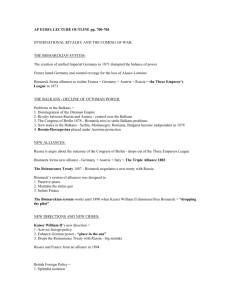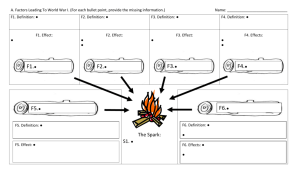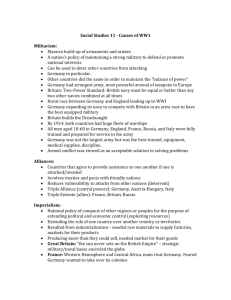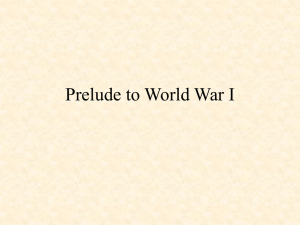History 20 World Issues
advertisement
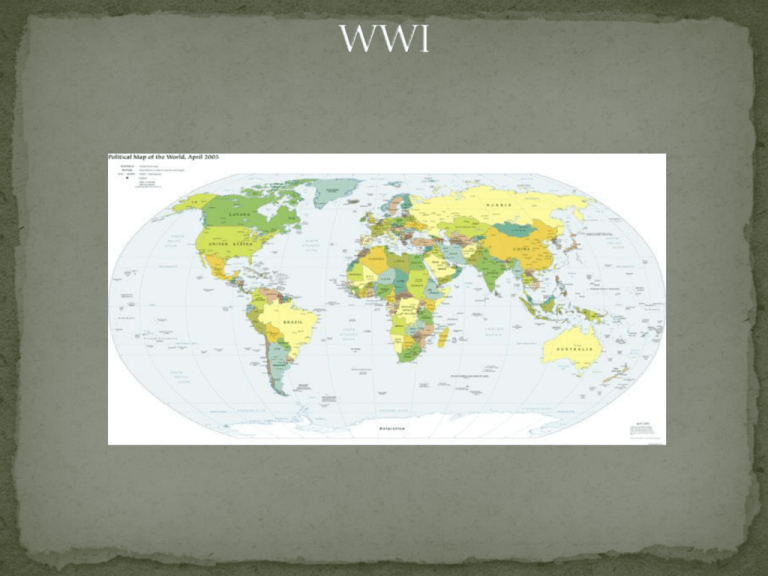
Population – increased Technology – advancements in transportation and communication Occupation – new advancements = new jobs Immigration – 45 million had left Europe in 60 years Women’s Suffrage – women wanted the right to vote Politics – nations were stilled ruled a an elite few Imperialism – race for colonies lead to conflict Effectively increased food output by 1/3rd End Result? Explosive population growth From 1800 on the worlds population increased 6 fold Fuelled by the 4 field crop rotation Legumes and clover cultivated in otherwise fallow fields Clover and excellent livestock crop… beef becomes more plentiful What major historical event was made possible by the Agricultural Revolution? Fuelled by the massive population growth Extra people… what to do? Migration to cities Mechanization in Factories Spinning Mule / Jenny 1764 Britain led the pack because of its unique geographic features Economic historians are in agreement that the onset of the Industrial Revolution is the most important event in the history of humanity since the domestication of animals and plants. 3 innovations Automation in textiles Metallurgy Steam Power Resulted in.... 3 innovations Automation in textiles Metallurgy Steam Power Resulted in.... Factories… the modern world… etc… Imperialism, as defined by The Dictionary of Human Geography, is "the creation and/or maintenance of an unequal economic, cultural, and territorial relationship, usually between states and often in the form of an empire, based on domination and subordination." Boer War Russo-Japanese War British versus Boers Japan attacks China – (South Africa) leads to conflict with Russia – Japan wins Paradigm – a pattern of thought that has a strong influence on the way societies act Conditions leading to war: 1. all major European nations had military plans 2. entry to war made by a few elite men 3. radical changes of the time: A. new nations arose B. new technologies – explosives, railway, electric motors, physics and chemistry C. hostile atmosphere – alliances and ethnic tensions D. public more literate = aware of new ideologies Marxism: idea of a classless society – use of violence Darwinism: the survival of the fittest Imperialism – the policy to extend power (colonies) - benefits: more land, spread religion, raw materials, conquer inferior people - Britain and France lead the way – Germany began too late (upset) – USA expanding in the Pacific Nationalism – loyalty/commitment to ones nation or people - Britain lead the way but Germany began to challenge - Germany vs. Britain – economic competitors – Germany jumped ahead - this will cause conflict - the fear of other nations gaining an advantage lead to large scale armament programs - Germany vs. Britain – naval race Alliance – a cooperation between nations – for security reasons - Triple Alliance – Italy, Germany, and Austria-Hungary Triple Entente – Russia, France, Britain Triple Entente Triple Alliance Britain – foremost power in the world Russia – large army – behind in of industrialization France – falling behind other nations – feared Germany Germany – wanted to “flex its muscles” Lots of tension in the Balkans AH took over Bosnia and Herzegovina Serbia set up the Balkans League – defeated the Turks Serbia wanted to unite all Serbs – AH was worried (areas in AH had large Serb populations) Balkans became known as “the powder keg ready to explode” August 1914 – Archduke Ferdinand and his wife were assassinated by a Serbian youth (member of the Black Hand) AH sent an Ultimatum to Serbia AH declares war on Serbia – Germany gives AH a blank check Russia agrees to help Serbia (protect their interests in the Balkans) Germany declares war on Russia Germany declares war on France Britain declares war on Germany – once they enter Belgium Russia wanted to extend their influence in the Balkans (protect their interests) AH wanted areas in the Balkans (especially Serbia) Germany wanted to break the Triple Entente – wanted to be powerful Britain wanted to stay the dominate nation France was just scared of Germany Schlieffen Plan (Germany)- an all out attack on France before Russia could attack from the East War Raw Materials Board – ration all materials for the war effort Auxiliary Service Law – all males 16-60 employed for the war Plan 17 (France) – to attack Alsace Lorraine (mineral area controlled by Germany) The war was welcomed by both sides (enthusiasm, patriotism, nationalism) – everyone expected a short war Propaganda was used by all sides – Propaganda: communication used at altering the attitudes of a society (posters were commonly used) Germany crushed neutral Belgium (this brought in Britain) Germany drove south into France Major Battles – Battle of the Marne (saved France – broke the Schlieffen Plan) – Ypres (gas warfare used) Oct. 1914 – stalemate occurred – this lead to trench warfare Area between the trenches – controlled by no one When soldiers left their trenches to cross over no man’s land Trench foot: Rats, lice, dead bodies, etc. Germany vs. Russia Major Battles – Tannenburg – Russia lost 140,000 troops (killed, prisoners) Germany was successful – Russian army 1/3 of troops had no guns (use swords or pitchforks) By 1917 – 3 million Russians had been killed or captured The Tsar had problems ruling his empire Tsar went to the front lines – left wife in charge, directed by a monk Rasputin Strikes broke out in 1917 Tsar abdicated the throne (ran away) A provisional government was set up by Kerensky New ideologies arose – The Russian Socialists Party – communist (based on Marx) Two sides emerged – both wanting power: 1. Mensheviks – use peaceful means to take control 2. Bolsheviks – use violence - #1 point was to get out of the war - lead by Vladimir Ilyich Ulyanov (Lenin) The Bolsheviks took over the gov’t – they quickly sign the Brest-Litovsk Treaty (out of the war) Bolsheviks introduced new ideas – no private ownership Civil War breaks out – two sides: A. Red Army – Bolsheviks – lead by Trotsky – supported by Germany B. White Army – Allied supported ** Red Army wins Under Lenin Russia becomes known as the USSR – Union of Soviet Socialist Republic Advancements: 1. Machine Gun 2. Tanks (Willie)– introduced by the British – Battle of the Somme 3. Planes – used for reconnaissance (spy), bombing and dog fighting 4. U-Boats – submarines – used mainly by the Germans – used to cut off supply lines 5. Gas warfare – mustard gas 6. Role of Women – employed in the work force When war broke out USA stayed neutral – made $ selling supplies US was drawn into the conflict due to: Zimmerman Telegram and U-Boat warfare 1915 – Lusitania was sunk – 128 Americans killed – US threatens Germany 1917 – several US boats were sunk during German blockade of Britain April 1917 US declares war on Germany Second Battle of the Marne – Allies push Germans back – Allies gain momentum Battles at – Amiens, Ypres and Verdun push Germany to their border Several allies of Germany and AH bowed out Germany and AH ask Us president Wilson to negotiate and armistice 11th hour on November 11, 1918 Germany surrenders (Remembrance day) US becomes the economic power in the world – made big $ during the war Europe is devastated The world was changed for ever (total war) 30 nations are represented at the conference – USSR not invited Results of the war: 1. Lives lost – 9.7 military, 10 million civilian and 21 million wounded 2. Cost of the war – 180 billion (direct) and 150 billion (indirect) 3. 4 Empires collapse- Germany, AH, Russia and Turkey (Ottoman) 4. Landscape of Europe ruined 5. many nations used up most of their resources 6. industrialization increased in non-European nations (Canada) The hope was that this war would be “the war to end all wars” Britain, France, USA and Italy made all the decisions at the conference – defeated nations were excluded (very odd) USA (Wilson) stated that there were three main causes to the war: 1. secret diplomacy 2. tendency of dominant nations to oppress others 3. autocratic gov’ts 1. end all secret treaties 2. freedom of the seas 3. End economic barriers between nations 4. Reduce arms 5. redraw the map of Europe 6. set up the League of Nations Germany had to: 1. accept total blame for the war (war guilt) 2. reparations $33 billion 3. Lost 1/10 of their nation – new nations arose 4. lost her colonies 5. limit their army/navy 6.. Gave up coal areas to France 7. Rhineland turned to demilitarized zone 8. Alscase-Lorriane given back to France AH, Turkey, and Bulgaria were divided into new areas New nations arose – Estonia, Latvia, Lithuania, Finland, Czech and Poland – ethnic groups were split – will cause future problems ** the treaty was not good at all Peace Treaty did not stabilize European politics: 1. great resentment in Germany 2. Germany still had war making potential 3.. Localized wars erupted – Poland vs. USSR 4. Britain and France did not end alliances

